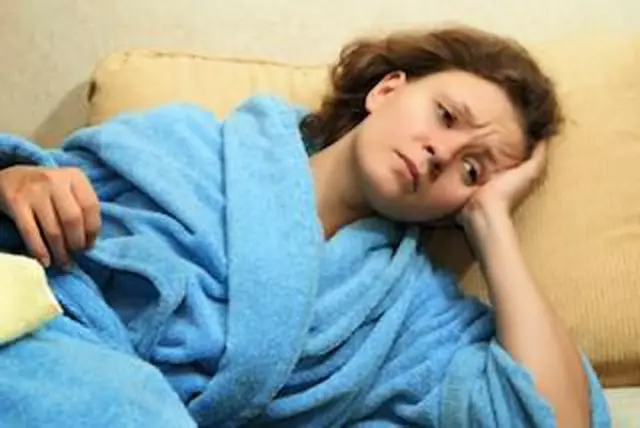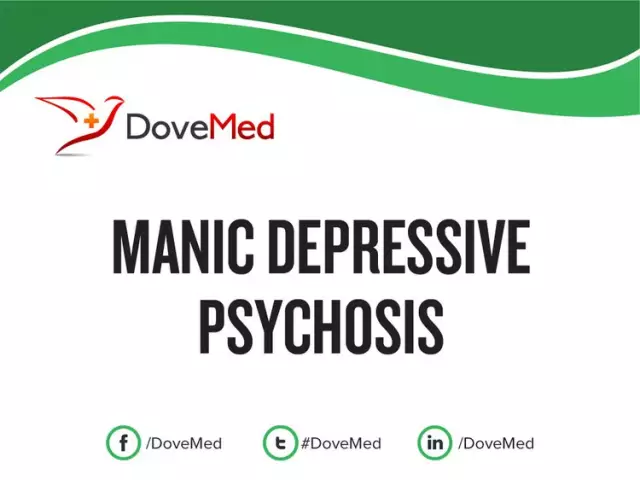- Author Rachel Wainwright wainwright@abchealthonline.com.
- Public 2023-12-15 07:39.
- Last modified 2025-11-02 20:14.
Depressive syndrome

Depressive syndrome is a painful human condition that is characterized by various mental and physical disorders. And although many people mean by depression, as a rule, boredom, melancholy and apathy, it is wrong to understand this pathology only as a manifestation of these symptoms. In fact, depression is a rather serious disease that affects the physical health of a person, and sometimes can lead to irreversible consequences. Therefore, depressive syndrome requires careful diagnosis and often long-term treatment.
Manic-depressive syndrome
Depression in different people can develop into separate types of pathology, which have both general and specific symptoms. The latter are inherent only in a specific type of this painful condition and help to identify it in determining the diagnosis. So, manic-depressive syndrome is characterized by the alternation of two main phases - manic and depressive, in the intervals of which periodic enlightenments can appear.
The first phase is characterized by the following symptoms of depressive syndrome:
- Elevated mood;
- Energy;
- Psychomotor agitation;
- Active gestures;
- Acceleration of thought processes.
The patient in this phase usually talks and laughs a lot, often he overestimates his capabilities and takes on work that in reality he cannot do. Often he has confidence in his own genius, so patients with manic-depressive syndrome can pretend to be artists, poets, actors, etc.
The second, depressive phase is the exact opposite of the first. At this phase, the patient has the following symptoms:
- Oppression;
- Dreary mood;
- Stiffness of movement;
- Inhibition of thought processes.
Depressive phases, as a rule, last longer than manias, and the frequency of these conditions varies from person to person: from several days to months. It should be noted that patients with manic-depressive syndrome are usually aware and even critically approach their condition, but they are unable to fight it.
In mild cases, treatment of a depressive syndrome of this type can be carried out on an outpatient basis, in severe cases, it can be done inpatiently, using strong antidepressants.
Astheno-depressive syndrome
Asthenic-depressive syndrome in medicine is a mental disorder characterized by such symptoms as:
- General weakness of the body;
- Fast fatiguability;
- Anxiety;
- Frequent headaches;
- Hypersensitivity;
- Inhibition of movement, speech and thought process.
The causes of this type of depression can be divided into internal and external. The first includes various stressful situations and pathological states of the emotional sphere. The external causes of asthenic-depressive syndrome are all kinds of diseases, for example: oncological diseases, serious operations, injuries, infections, diseases of the cardiovascular system, etc.
In adolescents and young people, the symptoms of this type of depressive syndrome can acquire a bright negative connotation. In this case, such signs are added to them as:
- Regular tantrums;
- Coarseness;
- Anger and irritability;
- Unreasonable protests.
A protracted illness is often fraught with the emergence of a guilt complex, to which is added a gloomy assessment of both the world around and one's own state. In addition, asthenic-depressive syndrome affects the physical health of a person. Against the background of this pathology, disturbances in the digestive system occur, pressure rises, appetite and sleep are upset, the menstrual cycle in women is often disrupted, libido disappears, etc.
It is important to note that a characteristic feature of this type of depression is an improvement in the psychoemotional state of a sick person after the elimination of the somatic symptoms of the disease or a good rest.
Treatment of depressive syndrome in this case directly depends on the severity of the disease. In some cases, the patient can be helped by a short session of psychotherapy, while in more neglected cases, not only a long course conducted by a psychotherapist will be required, but also the use of antidepressants and sedatives for a long time.
Anxiety-depressive syndrome
The name of this type of pathology speaks for itself: the main symptoms of this type of depressive syndrome are anxiety and panic fears. It is important to note that these signs are more typical for adolescence, and therefore this type of depression in most cases is observed precisely in the transition period. This is due to the increased emotionality, vulnerability and even an inferiority complex arising at this stage.

Anxiety-depressive syndrome manifests itself as painful fears of a different nature, which gradually turn into phobias. Very often adolescents who develop the syndrome are terribly afraid of punishment - for perfect and imperfect actions, for not being beautiful enough, smart, talented, etc. An important symptom of depressive syndrome in this case is the almost complete loss of the ability to objectively evaluate the environment the world, various situations in it and one's own personality. All this appears to the patient in the darkest light, since it is perceived as extremely hostile.
Against this background, persecution mania can also develop. Often, it seems to patients that they are all deceived, adjusting life situations in such a way as to lure them into a trap. People around can be perceived as enemy agents who watch their every step. Suspiciousness, suspicion, excessive sensitivity become constant signs of anxiety-depressive syndrome, taking away from the patient all the energy and strength to fight against dangers that do not exist in reality.
Treatment of a depressive syndrome in this case involves the immediate assistance of a professional psychotherapist, possibly with the use of sedative drugs.
YouTube video related to the article:
The information is generalized and provided for informational purposes only. At the first sign of illness, see your doctor. Self-medication is hazardous to health!






